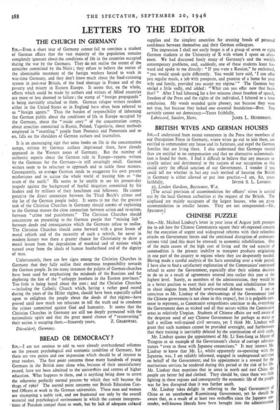BREAD OR DEMOCRACY ?
Sts,—I am not anxious to add to your already overburdened columns on the present psychological and economic condition of Germany, but there are two points and one impression which should be of interest to your readers. The first point concerns those many hundreds of young Germans in the British zone alone who, because of their unsatisfactory record, have not been admitted to the universities and centres of higher education. What happens to them, and is anything being done to arrest the otherwise perfectly normal process' by which they will become the thugs of 196o? The second point concerns our British Education Con- trol Officers at work in the German universities. These men and women are attempting a noble task, and are frustrated not only by the overall material and psychological environment its which the current interpreta- tions of Potsdam compel them to work, but by lack of adequate culaural supplies and the simplest amenities for creating bonds of personal confidence between themselves and their German colleagues.
The impression I shall not easily forget is of a group of seven or eight German students at the University of X with whom I spent an after- noon. We had discussed freely many •of Germany's and the world's contemporary problems, and, suddenly, one of these students leant for- ward and spoke to me directly: " If you were a Russian," he exclaimed, " you would speak quite differently. You would have said, ' I can offer you regular meals, a job oilth prospects, and promise of a home for your wife and family, provided you accept my regime.."' The German boy smiled a little sadly, and added: " What can you offer now that beats that? " After I had laboured for a few minutes about freedom of speech, freedom of the Press and the rights of the individual, I faltered to a lame conclusion. My words sounded quite phoney, not because they were not true, but because they lacked one- essential foundation—Brot. You certainly cannot eat democracy.—Yours faithfully,


























 Previous page
Previous page